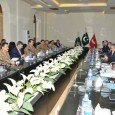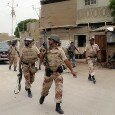By Shams Momand –
Some get a five-finger discount on American military goods
This was around April 2004. I was talking to a few journo friends of mine in Khyber agency’s frontier town, Landi Kotal. During the course of the conversation, I found out that there were some locals ‘experts’ who could expertly break the seals of containers off to Afghanistan, pilfer the valuables within, fill them up with cheap trinkets and reseal them as good as new.
Back then, this illegal trade was carried out as a matter of routine activity in the open. But only a few people were involved. With the passage of time, this limited activity has grown into an expansive business concern. And those who started it all have become a part of a widespread network which reaches Karachi to Chaman, Torkham, Kabul, Bagram and Kandahar.
As the business expanded, and the two-bit gangs of thieves became international syndicates, the formality of breaking and resealing containers seemed like an unnecessary inconvenience. After that, with the connivance of custom officers, loaded containers were frisked off. This went on fast and furiously till 2009. So much so, that when the matter reached the courts and the customs intel and investigation came forward, with thousands of containers going missing.
An acquaintance from Landi Kotal who has been associated with this trade for almost a decade told me that this breakage of seals first started in Moro, Sindh. Then experts were produced in Kandahar and the skill was then transferred to Landi Kotal. First, these expert seal-breakers were given a mere ten grand for their work. If something extremely valuable was found, they would be paid five or ten extra. But after a while, the trend of breaking open the doors at the hinges and re-fixing caught on and was preferred to the breaking of seals. Soon, there was no need for any of this breaking seals or hinges.
This was because a few Afghan officers associated with the Nato forces had become part of the gang in Bagram; these officers would not only confirm receipt of these containers by stamping officials papers but also pay Rs 3 lac upfront. After this started, the breaking of seals dropped quite a lot in Pakistan. Because not only did breaking seals have its share of dangers but the earnings were also up-and-down. Compared with that, sending the containers to Bagram and receiving transportation fare and 3 lacs in cash was an attractive business proposition. Once the container was there, it was the Afghans’ headache or that of the Americans or their Nato associates.
Those associated with this trade denied that any arms were found in these containers. But they did say that a few arms and cartridges, and even amazingly a small plane(!), were found in the containers that were sent back by the Nato forces stationed in Afghanistan. It seemed as if the bottom part of the plane had been damaged during landing. The person who had broken the container offered to sell the plane to me for Rs 6 lacs. I talked to a few officials to sell the plane but nobody showed any significant interest. A few days later, I found that the plane had been sold for Rs 70 lacs.
In 2009-10, when extremism was rampant in Khyber Agency, it happened twice or thrice that militants abducted containers from the Pak-Afghan highway in broad daylight. It was learned later that these containers held an entire tank (in parts) and an armoured vehicle which was then used by the Taliban leader Hakimullah Mehsud and his associates. Pictures of that vehicle in use graced various media as well.
A driver of these containers, with an experience of almost five years, narrated that the drivers of these vehicles mostly used to take the route of the Indus Highway from Karachi and reached Torkham via D I Khan and Kohat. But of late, they had now been using the route that passed from Mianwali and Muzaffargarh. In Sindh, the areas surrounding Hyderabad and the area from Moro’s region Tarunda to Mianwali and Tarnol were dotted with centres of this illegal trade of opening containers. He said that, in effect, the same gang was operating from Karachi to Kandahar and Kabul to Bagram; when there was a problem in one place, they would become operational and active in some other place. He also told that the drivers of these containers bribed American and Nato officials with booze, cannabis and heroin so that they would overlook any discrepancy in the weight and/or breaks in the seal.
Some locals also had amazing revelations about attacks on Nato oil tankers. They said that the owners of these tankers were themselves involved in the attack about fifty percent of the times. This was because many of these tankers had been bought on a lease and insured. Thus, some greedy owners would empty the tankers of the oil and sell the petrol separately while also claiming the insurance money after the tanker went up in smoke. Milking it for all its worth. But many of the attacks were the real deal. And 75 people lost their lives and more than a hundred were injured in such incidents.
Many tribal areas on the Af-Pak border and the Karkhano market near Peshawar had many centres of trade that bought and sold stuff going to Afghanistan in the name of transit trade. Business boomed as stolen objects from containers were brought here from 2003-2008. Apart from centres in the tribal areas, Sitara Market comprising of almost 80 shops was established in Karkhano. Buyers from all over the country could buy with ease US and Nato military knick-knacks such as night-vision binoculars, bullet-proof jackets, helmets, daggers and knives, boots, torches, military uniforms, belts and even electronic gadgets. Not only these things but valuable American arms such as shotguns, light machine guns and different kinds of pistols were also available readily in Karkhano and markets linked to it in Landi Kotal and Wazir Dhand in Khyber Agency.
But these days, such arms are presented with discretion to the more discerning customer because a raid by security forces about two years ago led to the confiscation of foreign arms worth crores. That raid almost spelled an end to the business of arms. When I asked shopkeepers about American night-vision goggles and arms in Landi Kotal and Wazir Dhand, they eyed me suspiciously at first. Only after a friend’s assurance did a shopkeeper reveal that M-4 and M-16 rifles are still available but their prices had almost doubled and that they were traded from home and not the market and only shown to people who wouldn’t rat them out and were sure-shot buyers.
Since 2009, after the surfacing of the containers scandal, this business has been declining. Sitara Market is now adorned by Chinese products rather than American arms and gadgets. Most shops now sell eatables and electronics. Whereas in Landi Kotal and Wazir Dhand, replicas of American arms also carry the ‘Made in USA’ label.
When I asked a shopkeeper about night-vision goggles in Sitara Market, he told me that someone had brought in a set a few days and was asking the price of Rs 70,000. The shopkeeper said that he did not have that much money on him; otherwise he would have bought that set and not sold it for a penny less than Rs 1,20,000. I also found another shopkeeper buying American goods wholesale. Upon further investigation, it was found that the good merchant ran an establishment in Ferozepur, Lahore which, according to him, sold all kinds of American military paraphernalia, even arms. He presented me with his visiting card. When asked about whether he had the requisite license and/or registration to set up such shop, he merely smiled and named some intelligence agencies and said that their personnel visit me and instruct to sell anything but liquor and heroin.
A shopkeeper in Jalalabad in the border area of Torkham accepted after a long conversation that they are sold American goods. But he also said that the sellers of these goods were Afghan locals and never have US and Nato officials sold these things to anybody directly.
A senior journalist working in Dera Ismail Khan (who had established professional links with the Taliban) told me that the Taliban seized two containers from F R Tank around six years ago. These containers had two valuable Humvees in addition to a load of other stuff. Later, a Taliban commander told the said journalist of the intention to use these very vehicles for a suicide attack on a Nato checkpost in Afghanistan. He explained that it would be simple as these vehicles were never stopped far from the checkpost as this kind of vehicle was only in the possession of the Nato forces. Anyways, it couldn’t be found out if the plan was actually executed or not.
According to the available information during the compilation of this report, it also came to the fore that the stealing of containers declined after 2009, though containers were made to disappear with the involvement of Afghan officials in Bagram. After the Salala incident, when the Nato supply lines were closed, this activity came to an immediate halt. Many people associated with this trade are now in quite the pickle. Dozens of godowns in Landi Kotal where seals were broken and fixed are now empty and desolate.
People involved in this trade inform of two ways that American arms filter in:
- Some soldiers stationed in Afghanistan do not shy away from selling arms if and when they get the opportunity. Or the Afghan official working with them also don’t hesitate when the chance presents tself.
- Some of the arms that the Taliban get their hands on during their activities reach the marketplaces. (Even though they use most of the armament so obtained as booty themselves. Like the Taliban ameer Umar Khalid boasted to Raqim Al Haruf in Mohmand Agency that he had gotten his machine gun by killing an American officer. A similar boast was made by Hakeemullah Mehsud)
In short, as is evident from the above, American military equipment (which includes certain sensitive electronic gadgets and gizmos) is available openly and widely in the market places of Karachi, Lahore, Quetta and Peshawar. Not only intelligence officials of different countries but local militants are benefitting from this tremendously. The closure of Nato supply routes has led to a relative decrease in the business and its related activities. But with the possible resumption of supplies soon, it must be kept in mind that these activities too will resume.






























































































